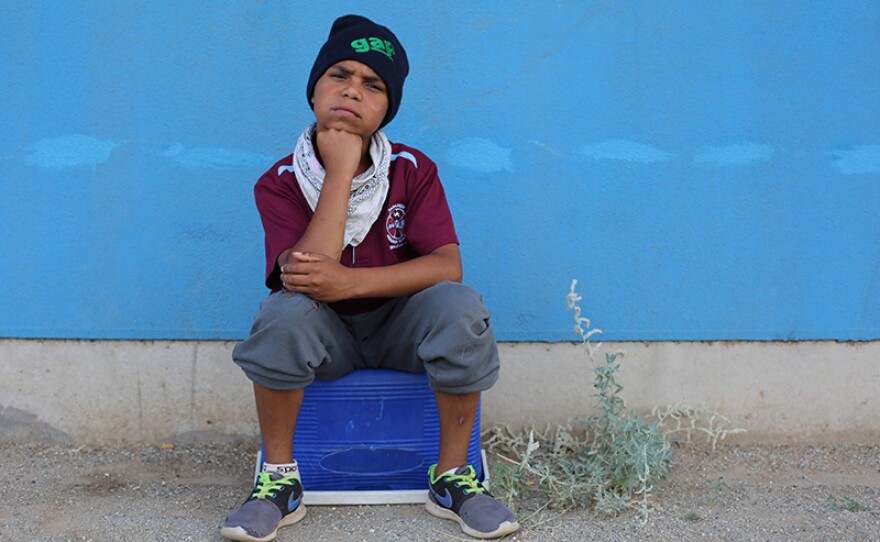Ten-year-old Dujuan is a child-healer, a good hunter and speaks three languages. As he shares his wisdom of history and the complex world around him we see his spark and intelligence. Yet Dujuan is ‘failing’ in school and facing increasing scrutiny from welfare and the police.
As he travels perilously close to incarceration, his family fight to give him a strong Arrernte education alongside his western education lest he becomes another statistic. We walk with him as he grapples with these pressures, shares his truths and somewhere in-between finds space to dream, imagine and hope for his future self.
Director Maya Newell’s first feature "Gayby Baby", sparked a national debate in Australia when it was banned in schools. Told through the lens of four children in same-sex families during the fight for Marriage Equality, the film offered the voice of those being ignored.
Made in collaboration with Dujuan and his family "In My Blood It Runs" tackles another heated topic, First Nations education and juvenile justice and places the missing voice of children front and center.
Filmed candidly and intimately, we experience this world on the fringes of Alice Springs through Dujuan’s eyes. Dujuan’s family light candles when the power card runs out, often rely on extended family to drop around food and live alongside the ingrained effects of colonization and dispossession.
Every day in the classroom, Dujuan’s strength as a child-healer and Arrernte language speaker goes unnoticed. While he likes school, his report card shows a stream of ‘E’s, which make him feel stupid.
Education is universally understood as a ticket to success, but school becomes a site of displacement and Dujuan starts running away from the classroom.

In stark contrast to his school behaviour, on his ancestral homeland surrounded by his family, Dujuan is focused, engaged and learning. We begin to see Country as a classroom – a place where the resilience can grow and revolution is alive.
But the pressures on Dujuan in Alice Springs are ever encroaching – educational failure, domestic violence, child removal and police. In May 2016, images of children being tortured at the Northern Territory’s Don Dale Youth Detention Centre are leaked and spike global uproar. In fact, 100% of children detained in the Northern Territory are Indigenous.
We begin to realize that Dujuan’s world does not exist in a vacuum, but is a microcosm of a much larger political and historical battle being waged in Australia. This event offers a stark insight into a potential future for Dujuan. How will his family and community rise above?

"In My Blood It Runs" looks beyond the ‘problem’ to see the people. Instead of seeing this Aboriginal boy as a ‘criminal’, we see a child who has experienced systematic abuse; instead of ‘bad parents’, we see a family who has been systematically stripped of all agency yet undeniably love their kids; instead of a ‘failure’ at school, we see a child whose talents have been completely overlooked. And crucially, this child observes the inequality of the world he is presented with.

In the end, when Dujuan cannot run nor fight alone, he faces the history that runs straight into him and realises that not only has he inherited the trauma and dispossession of his land, but also the strength, resilience and resistance of many generations of his people which holds the key to his future.
“White people educate our kids in the way they want them to be educated. But I want them to learn their language. So they can carry on their language. I want my children to grow up learning in both ways” -Carol Turner, grandmother

Watch On Your Schedule:
This film will stream online on POV.org in concurrence with its broadcast.
Watch with the PBS Video App, or full episodes of POV are available to stream on demand with the KPBS Video Player for a limited time after broadcast.
Join The Conversation:
POV is on Facebook, and you can follow @povdocs on Twitter.
"In My Blood It Runs" is on Facebook and Instagram. Follow @inmyblooditruns on Twitter. #InMyBloodFilmPBS
Credits:
A co-presentation of Pacific Islanders in Communications. Director/ Producer /DOP/ Editor: Maya Newell. Producers: Rachel Naninaaq Edwardson, Larissa Behrendt, Sophie Hyde. Executive Producer / Senior Traditional Owner of Mparntwe (Alice Springs): Felicity Hayes. Impact Producer; Alex Kelly. Associate Producer: Lisa Sherrard.





